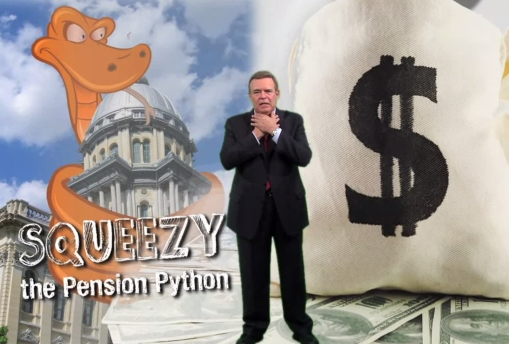Illinois’ government pension system, arguably the worst in the nation, will continue to worsen in the months ahead. Legislators failed in their January lame-duck session to do anything to reform the system, which has a $97 billion unfunded liability that rises $17 million a day.
Without a pension system overhaul, Illinois taxpayers will continue to see money siphoned away from education, medical care, and other services to fund pensions. In a desperate attempt to drive home that point, Gov. Pat Quinn (D) had his staff create “Squeezy, the Pension Python,” a cartoon depiction of a giant snake squeezing the state Capitol building, schools, a cop, and a hospital. They also created a four-minute YouTube video on pensions that features Squeezy.
Legislators Create Commission
Shortly before the session ended, Quinn made a last-ditch attempt to salvage pension reform by supporting the creation of an eight-member bipartisan pension commission. Legislative leaders will appoint the members, who will write a bill to fix the pension system and close the $97 billion unfunded liability. Their bill will automatically take effect unless the General Assembly votes to block it.
The legality of this arrangement is an open question. If either the House Speaker or the Senate President does not call a disapproval vote, the bill becomes law. The only way to block it is for both chambers to pass a joint resolution disapproving the measure .
“Gov. Quinn’s last-minute attempts to outsource legislative authority to a commission to fix the state’s pension problems is evidence that the Illinois legislature is too cowardly to make the tough decisions necessary to keep the state afloat,” said John Nothdurft, director of government relations at The Heartland Institute. “This is even more astonishing since the state is overwhelmingly controlled by one party [Democrats].”
Alterative Plan Offered
The legislation that received the most serious consideration was sponsored by Reps. Elaine Nekritz (D-Northbrook) and Dan Biss (D-Evanston). Their bill would have frozen cost-of-living increases for all state workers and retirees. After the freeze ended, cost-of-living increases would have applied only to the first $25,000 of pensions. Adjustments for inflation would not have been awarded until a worker reached the age of 67. Most government workers in the state retire much before reaching 67 years old and receive annual pension increases right away.
The Nekritz-Biss bill would have gradually increased the amount employees would have contributed to their pensions, increasing by 1 percentage point the first year and 1 percentage point the second year. The proposal also would have placed a cap on the size of the pensionable salary with two standards: a worker’s current salary or a level based on a Social Security wage base, whichever is higher.
Constitution Viewed As Obstacle
Illinois’ constitution prohibits fundamental reform of pensions for existing public-sector employees, which makes any reform effort more difficult. Any pension reform bill that makes it through the General Assembly likely will be challenged in court.
Their bill contained a new funding guarantee for pension payments that could have proven problematic.
“The guarantee is a dangerous precedent and part of a bill that preserves the same flawed defined benefit system that’s been at the core of Illinois’ pension ills,” wrote Ted Dabrowski, vice president of policy at the Illinois Policy Institute, at the Institute’s blog. “The state’s crisis has been long in the making, but legislators must avoid the temptation to just pass something—anything—on pension reform.”
Of course, the current system has defenders, particularly among government workers and retirees.
Unions Demand Higher Taxes
At the blog of the American Federation of State, County and Municipal Employees (AFSCME), the labor union wrote, “AFSCME, which is also a leading member of the National Public Pension Coalition, has long maintained that undermining public pension systems to fix a state’s economic troubles is not only unnecessary, but misses the target. It’s not pensions that caused those troubles in the first place, but a lack of revenues—especially from corporations that take advantage of tax loopholes, and the wealthy who have not paid their fair share of taxes.”
The pro-union We Are One coalition issued this press statement:
“We are extremely disappointed that Governor Quinn and legislative leaders have shut out the voices of workers and retirees in their latest talks on pension legislation. Instead, once again, Illinois politicians are preparing to use unconstitutional schemes to ruin the retirement security of hundreds of thousands of Illinoisans while ignoring the state’s revenue problem.”
Illinois in 2011 raised the state income tax 67 percent and the state corporate income tax 46 percent, taking another $7 billion annually from residents and businesses. Virtually all of that extra money has gone to pensions, leaving the state budget billions of dollars in deficit. The state is nearly $9 billion behind in paying its bills.
We Are One added, “It doesn’t have to be this way. The coalition has put forth a real plan to fix the state’s pension funding problem and called to meet with lawmakers at a mid-January summit. Our plan—to create an ironclad guarantee, curtail corporate welfare by closing tax loopholes, and share in the sacrifice by asking employees to pay more into the pension systems—remains the only fair, constitutional, and sustainable proposal on the table.”
Private Sector Offers Model
Heartland’s Nothdurft argues the state should use private-sector efforts to bring down pension costs as a model.
“In order to fix the pension system, Illinois must follow the private sector’s lead and switch workers from a defined-benefit pension system to some type of a defined-contribution system,” he said. “The amount of money that government is on the hook for must be capped, immediately funded, and protected from borrowing. Only then can Illinois eliminate the burden of future pension liabilities, avert the pension crisis, and make budgeting more predictable.”



